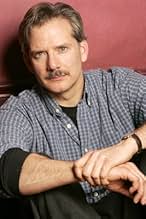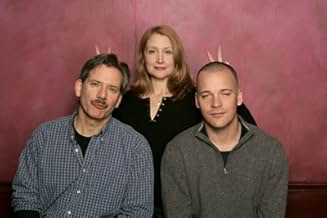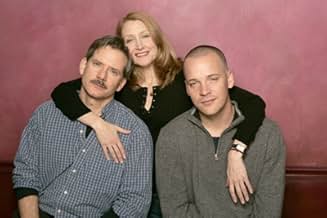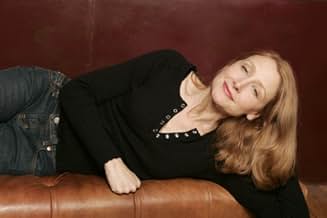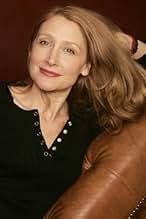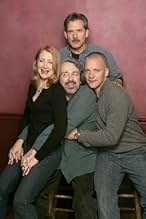IMDb RATING
6.4/10
2.5K
YOUR RATING
A grief-stricken screenwriter unknowingly enters a three-way relationship with a woman and her film executive husband - to chilling results.A grief-stricken screenwriter unknowingly enters a three-way relationship with a woman and her film executive husband - to chilling results.A grief-stricken screenwriter unknowingly enters a three-way relationship with a woman and her film executive husband - to chilling results.
- Awards
- 1 win & 2 nominations total
Craig Hamrick
- Party Guest
- (voice)
- (uncredited)
Jason-Shane Scott
- Robert's Masseuse
- (uncredited)
Bridgetta Tomarchio
- Female Guest
- (uncredited)
- Director
- Writer
- All cast & crew
- Production, box office & more at IMDbPro
6.42.5K
1
2
3
4
5
6
7
8
9
10
Featured reviews
Trio of Talented Actors in an Unconvincing and Wordy Film
Despite the earnest work of three talented actors, "The Dying Gaul" is a slow and ponderous film that betrays its stage origins. Unfortunately, the film opens with a scene that seems improbable, if not downright impossible, as a film producer attempts to purchase an original screenplay from a first-time writer who plays coy over principles, despite a million-dollar carrot. Before long, the producer seduces the writer, and the two men carry on an illicit affair behind the back of the producer's wife. However, the wife is intrigued after meeting the writer, and she begins to correspond with him in on-line chat rooms under the guise of a gay man. The sham that the wife uses to uncover the affair and psychologically harass the young writer would not fool anyone, let alone an educated writer, and the film falls apart from lack of credibility. Although Hitchcock may have been able to make lengthy scenes of two characters instant-messaging each other over a computer into classic cinema, director Craig Lucas has yet to hone those skills, and the instant-messaging exchanges are leaden to be polite. Fortunately, my watch has a dial that illuminates in the dark. The direction of the film in general is slowly paced, and there is little visual excitement or breaking through the boundaries of the stage-bound dialog.
Fortunately, the always-wonderful Patricia Clarkson plays the wife, and she does wonders with a part that is not intrinsically interesting. While Peter Sarsgaard generally falls into the "always-wonderful" category as well, his subtly mincing shtick as the gay writer seems as though it were lifted from the worst episodes of "Will and Grace." Sarsgaard played a gay (or bisexual) man far more convincingly in "Kinsey." While there certainly are effeminate and fey gay men, those stereotypes have already been played to death on screen, and a fresher concept would have been expected of an actor with the talents of Sarsgaard. Campbell Scott plays his part well, although, when a viewer's mind wanders to thoughts of how well Scott is aging, the actor is apparently not fully engaging the audience's attention.
"The Dying Gaul," while not a complete failure, is nonetheless a disappointment and little more than an acting exercise for three talented performers. The wordiness and leisurely pacing may have worked on stage, and the flimsy plot devices may also have played more credibly in the theater. However, on film, "The Dying Gaul" fails to engage or convince and ultimately falls flat.
Fortunately, the always-wonderful Patricia Clarkson plays the wife, and she does wonders with a part that is not intrinsically interesting. While Peter Sarsgaard generally falls into the "always-wonderful" category as well, his subtly mincing shtick as the gay writer seems as though it were lifted from the worst episodes of "Will and Grace." Sarsgaard played a gay (or bisexual) man far more convincingly in "Kinsey." While there certainly are effeminate and fey gay men, those stereotypes have already been played to death on screen, and a fresher concept would have been expected of an actor with the talents of Sarsgaard. Campbell Scott plays his part well, although, when a viewer's mind wanders to thoughts of how well Scott is aging, the actor is apparently not fully engaging the audience's attention.
"The Dying Gaul," while not a complete failure, is nonetheless a disappointment and little more than an acting exercise for three talented performers. The wordiness and leisurely pacing may have worked on stage, and the flimsy plot devices may also have played more credibly in the theater. However, on film, "The Dying Gaul" fails to engage or convince and ultimately falls flat.
Interesting, watchable, and maddening
I enjoyed this film, up to a point- and that point was almost exactly the half way mark, where the writer director chose to go the maudlin implausible route instead of sticking with what he had, which was wonderful.
To have three characters in conflict and resolve it without any fancy plot device would have been truly courageous, but sadly what started out so lovely descended into melodrama and tedium.
That being said, Craig Lucas is clearly a talent to watch, he did a marvelous job with the actors- particularly Peter Skaarsgard, who does wonderful work, and the script is smart and even touching in places.
Campbell Scott seemed miscast to me, wooden and distant at places but oddly brazen in others. I can't imagine a married studio executive actually touching and almost kissing a writer ON THE LOT. I found myself imagining what other actors would have done with the role, never a good sign. But then again, he was one of the producers, so Mr. Lucas had his hands tied.
All in all, the first act was so promising that I was angered by the way Lucas decided to end it.
To have three characters in conflict and resolve it without any fancy plot device would have been truly courageous, but sadly what started out so lovely descended into melodrama and tedium.
That being said, Craig Lucas is clearly a talent to watch, he did a marvelous job with the actors- particularly Peter Skaarsgard, who does wonderful work, and the script is smart and even touching in places.
Campbell Scott seemed miscast to me, wooden and distant at places but oddly brazen in others. I can't imagine a married studio executive actually touching and almost kissing a writer ON THE LOT. I found myself imagining what other actors would have done with the role, never a good sign. But then again, he was one of the producers, so Mr. Lucas had his hands tied.
All in all, the first act was so promising that I was angered by the way Lucas decided to end it.
Dying Plot
I just saw this at the Seattle Film Festival, Peter Saarsgard was there to answer questions. The movie is extremely watchable for the first half of the way through, is built on a fascinating premise with interesting characters (a bisexual movie producer and his wife who reside in a Lifestyles of the Rich And Famous type beachside modern mansion, a young gay writer whose lover has died of AIDS), and builds to a pitch of extreme suspense. After that, however, the plot stumbles and the film's conclusion turns on a series of unbelievable events. I thought since the movie was based on a play, the plot would be clear, but it's almost as if the movie version was forced to cut out some important sequences, as there is never quite enough information about 1) how the woman obtains all her inside information on the writer, 2) how the writer's ex-wife was related to the characters and 3) most importantly, what happens to the characters at the end of the movie.
I went into the bathroom after the movie and joined a lineup of women who were also asking each, "What exactly happened there?" --- when it's not clear it's a sign of unclear movie-making.
I went into the bathroom after the movie and joined a lineup of women who were also asking each, "What exactly happened there?" --- when it's not clear it's a sign of unclear movie-making.
The Deadly Buddha
Suppose you had intimate knowledge about someone, and that someone did not know that you knew. How would you use that knowledge? Or would you? This issue is the undercurrent that carries the film's plot, like a fast moving stream, over a cliff, to a swirling, uncontrollable emotional vortex that changes people's lives forever.
Set in modern Los Angeles, a grieving gay screenwriter named Robert (Peter Sarsgaard) meets with Jeffrey (Campbell Scott), a wealthy film producer, to talk about Robert's script "The Dying Gaul", a tribute to his deceased lover and soul mate. Jeffrey invites Robert to his mansion by the ocean to meet his wife Elaine (Patricia Clarkson), who reads Robert's script and loves it. Over time, Robert and Elaine become friends, which sets up a triangular relationship that careens out of control when the anonymity of internet chat rooms provides cover for the discovery of secrets.
Artsy in tone and philosophy, the film exudes New Age dialogue, with conversation about Buddhist Karma, "the middle way", enlightenment, and deadly plant roots. The film's production design is chic. And while the color cinematography is mostly conventional, sometimes it is beautifully stylistic. I really liked those stark human silhouettes against that orange screen. The film's score, which connotes New Age spiritualism, is terrific.
Acting of the three leads is quite good. Patricia Clarkson is great as she sits in front of a computer monitor and, without speaking, displays myriad emotions through her facial expressions alone.
The chat room scenes are creative and emotionally potent, amid magnified keyboard clicking sounds. The back and forth exchange here is unusual, and striking in that it is meaningless when taken out of context, but highly enlightening when considered in relation to the film's plot, as this sample shows: "Hello"; "I hear clicking"; "I'm still here"; "Are you still there?"; "Yes"; "You sound really distracted"; "Yeah today"; "When?" "I'm sorry"; "No, I'm all yours"; "Are mine what?"; "No"; "Yes"; "Meaning?"; "I'm all yours now".
The film's screenplay does contain a rather obvious plot hole. And a couple of scenes involving Robert's son and former wife are too tangential to the story's trajectory. But these are minor issues.
"The Dying Gaul" may seem artistically or philosophically pretentious to some viewers. But I really liked it. Quite aside from the wonderful performances and the chic production values, the film's story has thematic depth, a quality lacking in most mainstream Hollywood films.
Set in modern Los Angeles, a grieving gay screenwriter named Robert (Peter Sarsgaard) meets with Jeffrey (Campbell Scott), a wealthy film producer, to talk about Robert's script "The Dying Gaul", a tribute to his deceased lover and soul mate. Jeffrey invites Robert to his mansion by the ocean to meet his wife Elaine (Patricia Clarkson), who reads Robert's script and loves it. Over time, Robert and Elaine become friends, which sets up a triangular relationship that careens out of control when the anonymity of internet chat rooms provides cover for the discovery of secrets.
Artsy in tone and philosophy, the film exudes New Age dialogue, with conversation about Buddhist Karma, "the middle way", enlightenment, and deadly plant roots. The film's production design is chic. And while the color cinematography is mostly conventional, sometimes it is beautifully stylistic. I really liked those stark human silhouettes against that orange screen. The film's score, which connotes New Age spiritualism, is terrific.
Acting of the three leads is quite good. Patricia Clarkson is great as she sits in front of a computer monitor and, without speaking, displays myriad emotions through her facial expressions alone.
The chat room scenes are creative and emotionally potent, amid magnified keyboard clicking sounds. The back and forth exchange here is unusual, and striking in that it is meaningless when taken out of context, but highly enlightening when considered in relation to the film's plot, as this sample shows: "Hello"; "I hear clicking"; "I'm still here"; "Are you still there?"; "Yes"; "You sound really distracted"; "Yeah today"; "When?" "I'm sorry"; "No, I'm all yours"; "Are mine what?"; "No"; "Yes"; "Meaning?"; "I'm all yours now".
The film's screenplay does contain a rather obvious plot hole. And a couple of scenes involving Robert's son and former wife are too tangential to the story's trajectory. But these are minor issues.
"The Dying Gaul" may seem artistically or philosophically pretentious to some viewers. But I really liked it. Quite aside from the wonderful performances and the chic production values, the film's story has thematic depth, a quality lacking in most mainstream Hollywood films.
Darkest Dark Or Maybe Darker
Hollywood is always a sinister setting, even for a comedy and "The Dying Gaul" is no exception. I don't intend to divulge the ins and outs of the story because that should be your job, but I feel compelled to talk about it because it kind of stacked all over me like some kind of alien jelly. I always loved Campbell Scott and I suspect I always will. He plays the devil - The "I'll give you a million bucks if you abandon completely yourself, your principles, your loyalties" - kind of devil - He is married to the splendid Patricia Clarkson ( part Meryl Streep part Wayland Flower's Madame) and the object of his temptation is Peter Sarsgaard, one of the best creepiest actors ever to appear on film. It may be a personal thing but he gives me the willies. The film is an uncomfortable journey through a strangely familiar landscape that becomes darker and darker. I will take my chances and recommend it.
Did you know
- TriviaThe film is dedicated to writer/director Craig Lucas's best friend, playwright Tony Kushner.
- ConnectionsFeatured in 2006 Glitter Awards (2006)
- How long is The Dying Gaul?Powered by Alexa
Details
- Release date
- Country of origin
- Official site
- Language
- Also known as
- El gal moribund
- Filming locations
- Production companies
- See more company credits at IMDbPro
Box office
- Budget
- $4,000,000 (estimated)
- Gross US & Canada
- $342,747
- Opening weekend US & Canada
- $53,944
- Nov 6, 2005
- Gross worldwide
- $345,041
- Runtime
- 1h 32m(92 min)
- Color
- Sound mix
- Aspect ratio
- 1.85 : 1
Contribute to this page
Suggest an edit or add missing content







